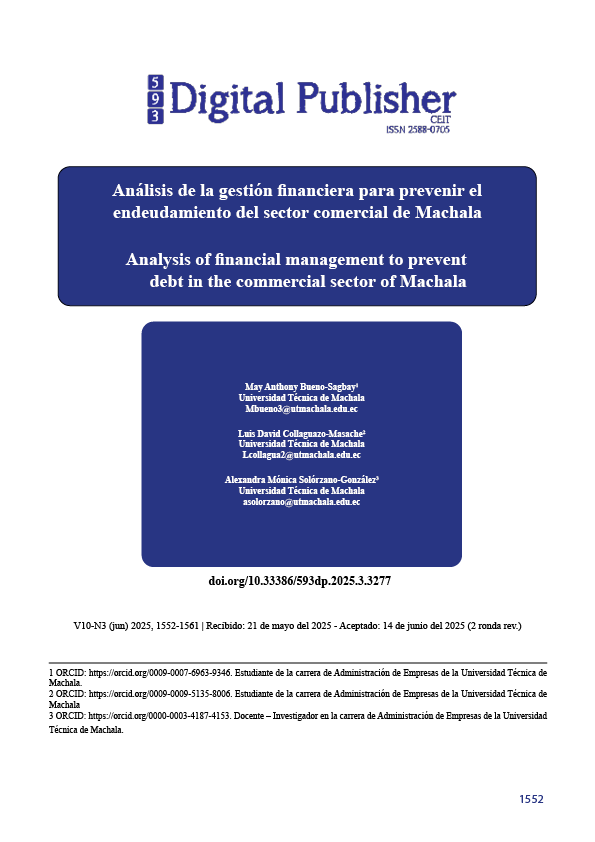Análisis de la educación financiera para prevenir el endeudamiento del sector comercial de Machala
Contenido principal del artículo
Resumen
Este análisis examina el impacto de la educación financiera en la reducción de la deuda en los microempresarios del sector comercial de la ciudad de Machala, Ecuador. El estudio se basa en la identificación del rol crucial que desempeña la educación financiera en la viabilidad económica de los pequeños negocios, particularmente en entornos de gran informalidad y escaso acceso a servicios financieros. A través de un método cuantitativo, de diseño descriptivo-correlacional y no experimental, se realizó una encuesta a una muestra de 380 microempresarios, escogidos de un total de 28,695 registrados, con el objetivo de investigar la correlación entre el grado de conocimientos financieros y la deuda percibida. Los resultados indican que el 60% de los participantes en la encuesta cuenta con un nivel elemental de formación financiera y que el 45% mantiene deudas comerciales en curso. Además, un 40% indica problemas para cumplir con estas responsabilidades. Mediante el estudio estadístico, se detectó una correlación inversa de moderada intensidad (r = -0.65; p < 0.01) entre el nivel de educación financiera y el nivel de endeudamiento percibido, lo que demuestra que una mayor habilidad financiera está vinculada con una menor vulnerabilidad crediticia. El dispositivo empleado evidenció una elevada confiabilidad (α = 0.87). El debate se centra en la importancia de establecer programas de educación financiera ajustados al entorno local, con perspectiva de género y accesibilidad, con el objetivo de promover la resistencia económica y la toma de decisiones fundamentadas. Para concluir, se corrobora la importancia de la alfabetización financiera para el progreso sostenible de los microempresarios de Machala, y se aconseja su incorporación en las políticas públicas y estrategias de crecimiento económico a nivel local
Descargas
Detalles del artículo

Esta obra está bajo una licencia internacional Creative Commons Atribución-NoComercial-CompartirIgual 4.0.
1. Derechos de autor
Las obras que se publican en 593 Digital Publisher CEIT están sujetas a los siguientes términos:
1.1. 593 Digital Publisher CEIT, conserva los derechos patrimoniales (copyright) de las obras publicadas, favorece y permite la reutilización de las mismas bajo la licencia Licencia Creative Commons 4.0 de Reconocimiento-NoComercial-CompartirIgual 4.0, por lo cual se pueden copiar, usar, difundir, transmitir y exponer públicamente, siempre que:
1.1.a. Se cite la autoría y fuente original de su publicación (revista, editorial, URL).
1.1.b. No se usen para fines comerciales u onerosos.
1.1.c. Se mencione la existencia y especificaciones de esta licencia de uso.
Citas
Albloushy, H., Connell, H., & Y., K. (2019). Adquisición de prendas ambientalmente sostenibles: Actitudes e intenciones de las consumidoras kuwaitíes. Consumer Studies, 43(4), 390-401. doi: https://doi.org/10.1111/ijcs.12518
Amagir, A., & Groot, W. M. (2017). Una revisión de los programas de educación financiera para niños y adolescentes. Educación Ciudadana, Social y Económica, 1(17), 56-80. doi:https://doi.org/10.1177/2047173417719555
Andriamahery, A. (2022). ¿El acceso a la financiación, los conocimientos técnicos y la alfabetización financiera ofrecen empoderamiento a las mujeres a través del desarrollo empresarial femenino? Fronteras en Psicología, 12(1), 1-16. doi:|https://doi.org/10.3389/fpsyg.2021.776844
Arellano, C., Rodríguez, M., & Núñez, L. (2022). Alfabetización financiera y género en el emprendimiento informal. Revista de Estudios Financieros, 49(2), 101–120. doi:https://doi.org/10.1016/j.ref.2022.101120
Avendaño, W., Rueda, G., & Velasco, B. (2021). Percepciones y habilidades financieras en estudiantes universitarios. Formación universitaria, 14(3), 95-104. doi:http://dx.doi.org/10.4067/S0718-50062021000300095
Buchholz, W., & Todd, S. (2020). The economic importance of financial literacy: Theory and evidence. Journal of Economic Literature, 3(58), 585–630. doi:https://doi.org/10.1257/jel.20191546
Demertzis, M., Moffat, L. L., Lusardi, A., & López, J. M. (2024). The state of financial knowledge in the European Union. econstor, 1(4), 1-16. doi:doi:10.46661/revmetodoscuanteconempresa.5479
Díaz, C., Hoyos, O., Arismendy, D., & Duque, P. (2023). Educación Financiera en la población joven: una revisión y análisis bibliométrico. Revista Colombiana de Educación, 1(89), 148-180. doi:https://doi.org/10.17227/rce.num89-14201
Dominique, B., & St-jean, É. (2021). Entrepreneurial behavior among older adults: A review and future research agenda. International Journal of Entrepreneurial Behavior & Research, 2(27), 377–402. doi:https://doi.org/10.1108/IJEBR-05-2020-0294
Fanta, A. B., & Mutsonziwa, K. (2020). The role of financial capability in SME sustainability. Journal of Small Business and Enterprise Development, 2(27), 178–195. doi:https://doi.org/10.1108/JSBED-10-2019-0356
Fernandes, D., Souza, F., & Silva, M. (2022). Educación financiera en países emergentes: retos y oportunidades. Revista Latinoamericana de Estudios Económicos y Sociales, 10(1), 33–55. doi:https://doi.org/10.22185/24487147.2022.100104
Iyengar, D., Nilakantan, R., & Rao, S. (2021). Sobre la resiliencia empresarial de los microempresarios ante las disrupciones económicas… Un poco de ayuda de los amigos. Journal of Business Logistics, 42(3), 360-380. doi: https://doi.org/10.1111/jbl.12269
Klapper, L., & Lusardi, A. (2019). Alfabetización financiera y resiliencia financiera: evidencia de todo el mundo. Financial Management, 3(49), 589–614. doi: https://doi.org/10.1111/fima.12283
Kumar, R. (2023). Iniciativas de sostenibilidad, innovadores intensivos en conocimiento y desempeño de las empresas: un análisis empírico. Revista Internacional de Estudios Financieros, 11(1), 14. doi:https://doi.org/10.3390/ijfs11010014
Kumari, R., Sharma, V., & Adnan, M. (2024). Alfabetización financiera de los microempresarios y su efecto en el rendimiento empresarial y la innovación: evidencia empírica de la India. Revista de Desarrollo, Gestión y Extensión de Pequeñas Empresas, 2(51), 133-148. doi:https://doi.org/10.1177/09708464241233025
Lusardi, A., & Mitchell, O. S. (2020). he economic importance of financial literacy: Theory and evidence. Journal of Economic Literature, 3(58), 585–630. doi:https://doi.org/10.1257/jel.20191546
Matthew C, S. (2020). La corrupción como trampa que se retroalimenta: implicaciones para la estrategia de reforma. The World Bank Research Observer, 35(2), 192–226. doi: https://doi.org/10.1093/wbro/lkaa003
Mungaray, A., Gonzalez, N., & Osorio, G. (2021). Educación financiera y su efecto en el ingreso en México. Problemas del desarrollo, 52(205), 55-78. doi:https://doi.org/10.22201/iiec.20078951e.2021.205.69709
Obstfeld, M. (2021). The impact of financial education: Evidence and policy implications. Oxford Review of Economic Policyx, 4(37), 692–720. doi:https://doi.org/10.1093/oxrep/grab023
ONU, M. (2022). Empoderamiento económico de las mujeres en América Latina y el Caribe. Nueva York: Gretchen Luchsinger.
Plata, K., & Caballero, J. (2020). Influencia de los programas de educación financiera sobre el comportamiento de los jóvenes: una revisión de literatura. Revista de Investigaciones , 15(2), 18-17. doi:https://doi.org/10.33304/revinv.v15n2-2020002
Ramírez, A., Muñoz, P., Quito, J., & Vintimilla, S. (2025). Revisión sistemática y meta-análisis de fiabilidad de los instrumentos de evaluación para la Demencia Frontotemporal. Revista Multidisciplinaria Investigación Contemporánea, 3(2), 75-255. doi:10.58995/redlic.rmic.v3.n2.a114
Shang, C. (2020). Crédito comercial y liquidez de acciones. Revista de Finanzas Corporativas, 62(1), 101586. doi:https://doi.org/10.1016/j.jcorpfin.2020.101586
Zao, T. (2024). Financial literacy, Cognitive bias, And personal investment decisions:A new perspective in behavioral finance. Environment and Social Psychology, 9(11), 3050. doi::10.59429/esp.v9i11.3050




